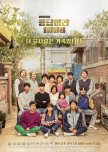Saying "Goodbye" is on my top 10 list of "Things I Hate to Do." In life, I have had to say goodbye to many things--friends, family members, the Dippin' Dots stand I worked at as a teenager, and as I venture into my last year of my 20s, I say goodbye to my youth as well. Bidding farewell to Reply 1988 continues this list, as I venture onward in dramaland and away from Ssammungdong. I say goodbye to that warm, neighborly feeling, that old nostalgia, that stirup-pant wearing era, and to the best youth drama I have ever seen.
Reply 1988 outshines its predecessors. The story primarily takes place in a singular setting, and yet the narrative does not stagnate; it does not become boring or trite; it does not make you sleepy when watching daily interactions of the families. Instead, the story of R1988 pushes at the heart and makes you yearn for friends who love each other this closely, for parents who love each other this much, for a life as simple and yet as hard as these characters' lives were. It takes you out of 2015 and 2016 and supplants you into 1988 where you take that same journey with the characters.
Perhaps the star of the narrative of R1988 is its ability to exert both laughter and tears at the passing of a few minutes, yet it never feels stilted. It brings us richness and variety of character within just the five friends, let alone the parents and siblings surrounding them. With that, we see intricate details of each person's character--like Bora's unspoken love for her parents, or Dong Ryong's inner philosopher, or Jung Hwan's hidden sweetness, or Taek's competitive strength. There are so many elements of character that we see, often unspoken, rise to the surface with the passing of a quick moment or a prolonged incident.
Not only did the narrative of R1988 promote emotions from the viewer, it also brought the winds of unpredictability with it. The writers, in their infinite wisdom, flipped the switch and delivered a romance not built on the standard female lead being the only one in love for the majority of the series nor a male lead who said nothing but ended up the romantic star. It gave the person who stepped up and took a risk the chance to shine (and shine he did-delivering kisses to die for and a sweet chemistry with the lead that was noticeable from the get go). Furthermore, the show gave many couples a chance at love, both new and renewed, lost and found. It was never unrealistic or unfair to anyone in the cast (as some are quick to say); instead, it offered options and chose the best one.
The laughter and tears that made me giggle until wheezing and leak all over my crooked glasses came from an illustrious cast. R88's five friends gave their all to show us their characters' fears, tears, love, admiration, consternation, that random move in Baduk, and so much more. I have to hand it to Ryu Joon Yeol and Park Bo Gum; they made me root for both of them and create #TeamPolyamorous as a hashtag. Their performances were so spot on, and a new star was born. Go Kyung Pyo has always been a personal favorite, and as the sweet, slightly nerdy but quite handsome Sun Woo, he once again stole my heart--this time, though, not with laughter so much as with sweetness. Lee Dong Hwi as Dong Ryong was simply adorable; I would like to see more from him. Hyeri's Duk Seon, though the weakest of these performances, was true to Duk Seon's character--bubbly and outgoing, if not a little bit kooky.
I could talk all day about the parents' roles as well. Ra Mi Ran, Kim Seon Young, and Lee Il Hwa trumped most drama mothers for being the most awesome trio of moms in a drama. They were not only funny, but they all showed signs of vulnerability and strength, and true to form, they were an unstoppable force on screen and in front of their husbands. Speaking of husbands/dads, all the dads were awesome as well, but Kim Sung Kyun takes the cake. His President Kim routine will forever been ingrained in my memory, but also his relationship with Ra Mi Ran showed a great example of how love grows with age.
The music of Reply 1988 also played a special role, not only in the background OST, but in the characters' lives. From Duk Seon trying to win a Walkman to her waiting anxiously outside a concert venue, to Dong Ryong's cover of "I Just Called to Say I Love You," to Ra Mi Ran's special dance, the power of music pervaded the narrative of Reply. It gave us warmth and it made us want to dance along.
Even at 1:30 to 2 hours per episode, I'm going to watch this again. I enjoyed it too much and loved it even more. There was never a dull moment in this series, and I will treasure it for a lifetime. However, now it is time to move on--to leave the streets of Ssangmungdong 1988 and flash forward to Dayton 2016. I look at my neighborhood--siding coming off of roofs, puttering old cars emitting exhaust, the paint on the doors of my house chipping, and the possibility that after I leave in a year or so, it may be the last time I see my home of nearly 22 years. It may be the last time I get to say goodbye to my neighborhood, just as it is my time to say goodbye to my youth.
For all things considered, the first 28 years have been a good run. That is my Reply.
Esta resenha foi útil para você?























